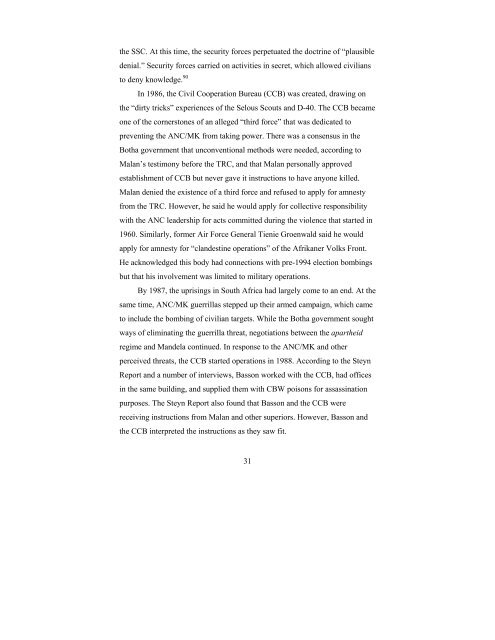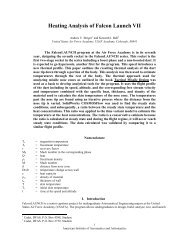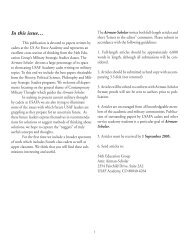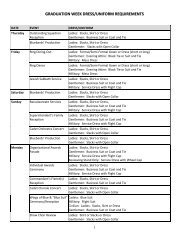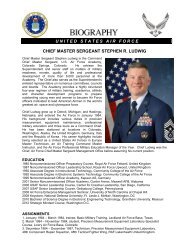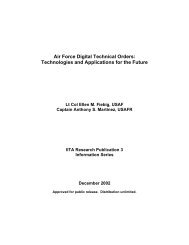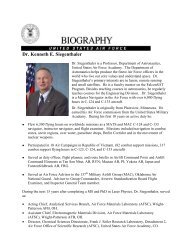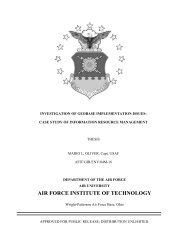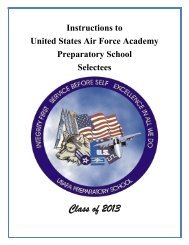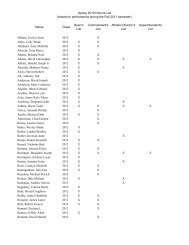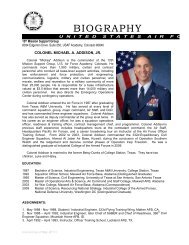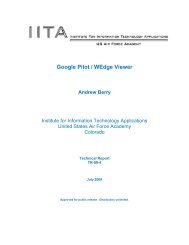the rollback of south africa's biological warfare program
the rollback of south africa's biological warfare program
the rollback of south africa's biological warfare program
Create successful ePaper yourself
Turn your PDF publications into a flip-book with our unique Google optimized e-Paper software.
<strong>the</strong> SSC. At this time, <strong>the</strong> security forces perpetuated <strong>the</strong> doctrine <strong>of</strong> “plausible<br />
denial.” Security forces carried on activities in secret, which allowed civilians<br />
to deny knowledge. 90<br />
In 1986, <strong>the</strong> Civil Cooperation Bureau (CCB) was created, drawing on<br />
<strong>the</strong> “dirty tricks” experiences <strong>of</strong> <strong>the</strong> Selous Scouts and D-40. The CCB became<br />
one <strong>of</strong> <strong>the</strong> cornerstones <strong>of</strong> an alleged “third force” that was dedicated to<br />
preventing <strong>the</strong> ANC/MK from taking power. There was a consensus in <strong>the</strong><br />
Botha government that unconventional methods were needed, according to<br />
Malan’s testimony before <strong>the</strong> TRC, and that Malan personally approved<br />
establishment <strong>of</strong> CCB but never gave it instructions to have anyone killed.<br />
Malan denied <strong>the</strong> existence <strong>of</strong> a third force and refused to apply for amnesty<br />
from <strong>the</strong> TRC. However, he said he would apply for collective responsibility<br />
with <strong>the</strong> ANC leadership for acts committed during <strong>the</strong> violence that started in<br />
1960. Similarly, former Air Force General Tienie Groenwald said he would<br />
apply for amnesty for “clandestine operations” <strong>of</strong> <strong>the</strong> Afrikaner Volks Front.<br />
He acknowledged this body had connections with pre-1994 election bombings<br />
but that his involvement was limited to military operations.<br />
By 1987, <strong>the</strong> uprisings in South Africa had largely come to an end. At <strong>the</strong><br />
same time, ANC/MK guerrillas stepped up <strong>the</strong>ir armed campaign, which came<br />
to include <strong>the</strong> bombing <strong>of</strong> civilian targets. While <strong>the</strong> Botha government sought<br />
ways <strong>of</strong> eliminating <strong>the</strong> guerrilla threat, negotiations between <strong>the</strong> apar<strong>the</strong>id<br />
regime and Mandela continued. In response to <strong>the</strong> ANC/MK and o<strong>the</strong>r<br />
perceived threats, <strong>the</strong> CCB started operations in 1988. According to <strong>the</strong> Steyn<br />
Report and a number <strong>of</strong> interviews, Basson worked with <strong>the</strong> CCB, had <strong>of</strong>fices<br />
in <strong>the</strong> same building, and supplied <strong>the</strong>m with CBW poisons for assassination<br />
purposes. The Steyn Report also found that Basson and <strong>the</strong> CCB were<br />
receiving instructions from Malan and o<strong>the</strong>r superiors. However, Basson and<br />
<strong>the</strong> CCB interpreted <strong>the</strong> instructions as <strong>the</strong>y saw fit.<br />
31


